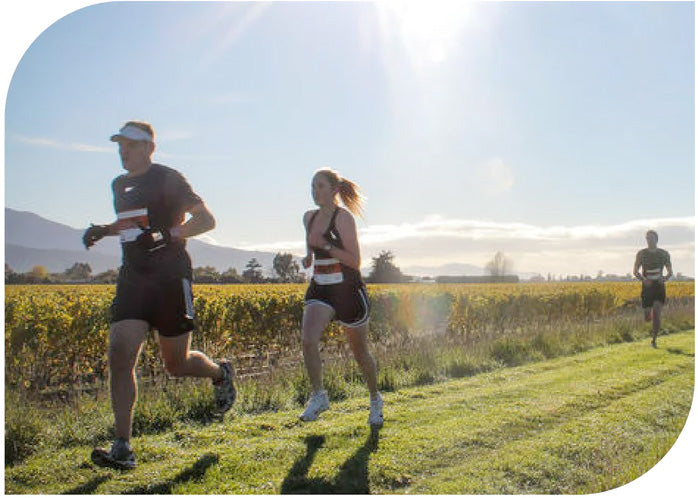With race day approaching it’s time to plan and practice your race day fueling. In order for everything to roll smoothly on course, it's never to early to implement a race day nutrition plan. To give you confidence in putting this together, we have some handy tips to help get the most out of your run.
Feed early & consistently
Our bodies have adequate reserves for the first hour or so of exercise, however the quicker you begin to refuel the less likely fatigue will hit like a freight train, so start within the first 20 minutes of the event. Evenly spread your energy needs over each hour to ensure a consistent supply of fuel. Don’t rely on natural hunger and thirst cues! A good tip is to set repeating 15-20 minute alarms on your watch to avoid race distractions and help cement this habit.
Carbohydrates will be your best friend
Carbs are essential for fuelling your muscles (and brain which has a big part to play in getting you across the line) so if you're planning on running over 1 hour then these need to be factored in.
Hourly carbohydrate requirements during a race differ for every person, but will generally range from 30-60g+ depending on intensity and duration.
Once you have calculated your hourly carbohydrate requirements, then consider where you will source your carbohydrates from. This will be your sports drink, food, gels or chew sources.
To find out how many grams of carbohydrates are in each of your intended race day foods, look for the ‘Carbohydrates Total’ line on the nutritional panel and check the serving size.
Hydrate, hydrate, hydrate
Hydration can be easily overlooked but has a strong link to fatigue. Research the course to find out the location of aid stations and work out the time it will take you to get between stations. If this is upwards of about 30 minutes then we suggest carrying hydration on you for these parts of the run.
Fluid requirements vary a lot (temperature, size, gender, fitness level etc) but a general rule of thumb is 500ml – 750ml+ each hour.
Regardless of weather, aim for a minimum of 500ml per hour. Note: It is particularly important to ensure you use hydration containing carbohydrates for energy but also electrolytes. You will be losing vital electrolytes in sweat and if these aren’t replaced (or you're drinking a truckload of plain water) you may be at risk of a very dangerous condition called Hyponatremia. Symptoms include confusion, nausea, headaches and even loss of consciousness, so be sure to replace electrolytes.
PeakFuel Hydration Drink contains both carbohydrates and all essential electrolytes (magnesium, sodium, potassium, calcium). If you are prone to excessive sweating, or race day looks like it will be particularly hot weather, consider topping up additional electrolytes.
Don’t be afraid to mix up your fuel
Real food is good race day food too! While food takes longer to digest, if you train yourself to eat small morsels regularly this can be a really effective way to remain energised.
TOP SPORTS NUTRITION TIPS:
Take extra
Always anticipate longer race times, and take take extra fuel accordingly. We have met countless numbers of athletes who have rocketed through races only to hit that dreaded wall and have nothing left to eat or drink to get through it. Even a few sweat covered jet plane lollies can save the day.
Breakfast is the first step to a successful day out
After a long night fasting it is essential to fuel up for the day ahead no matter what distance you are planning to run. If you tend to suffer from stomach issues plan to eat 2-3 hours before start time to give your body time to digest breakfast. Choose something that ideally contains carbohydrates but more importantly sits well with you. Practice different options and lengths of time before training long runs to make sure you have this nailed.
Practice in training
All of the sports nutrition theory in the world will not get you through your race if you physically can’t tolerate eating & drinking while running. Use your long training runs as a dress rehearsal for your race day nutrition plan. This means using the exact same brand of any gels/chews/electrolytes you plan to use on the day. As a result, your body will know exactly what to expect and if something doesn’t work for you there is time to change it. Remember to be patient, you do have to train your body to accept fuel while running so the earlier you start practicing your race day nutrition plan, the better.
Recover
The golden rule is to get carbohydrates and protein on-board within 30 minutes of finishing your run. Even if this is your last run for the foreseeable future your body will thank you for this in the days to come. Finally, don’t forget to congratulate yourself on your fantastic efforts, we often forget to take the time to do this, just remember you are so awesome for getting out there - so go, you!!
Race Day Nutrition Tips
